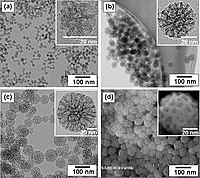
Photo from wikipedia
Implantable sensors continuously transmit information on vital values or biomarker concentrations in bodily fluids, enabling physicians to survey disease progression and monitor therapeutic success. However, currently available technologies still face… Click to show full abstract
Implantable sensors continuously transmit information on vital values or biomarker concentrations in bodily fluids, enabling physicians to survey disease progression and monitor therapeutic success. However, currently available technologies still face difficulties with long-term operation and transferability to different analytes. We show the potential of a generalizable platform based on gold nanoparticles embedded in a hydrogel for long-term implanted biosensing. Using optical imaging and an intelligent sensor/reference-design, we assess the tissue concentration of kanamycin in anesthetized rats by interrogating our implanted sensor noninvasively through the skin. Combining a tissue-integrating matrix, robust aptamer receptors, and photostable gold nanoparticles, our technology has strong potential to extend the lifetime of implanted sensors. Because of the easy adaptability of gold nanoparticles toward different analytes, our concept will find versatile applications in personalized medicine or pharmaceutical development.
Journal Title: Nano letters
Year Published: 2021
Link to full text (if available)
Share on Social Media: Sign Up to like & get
recommendations!